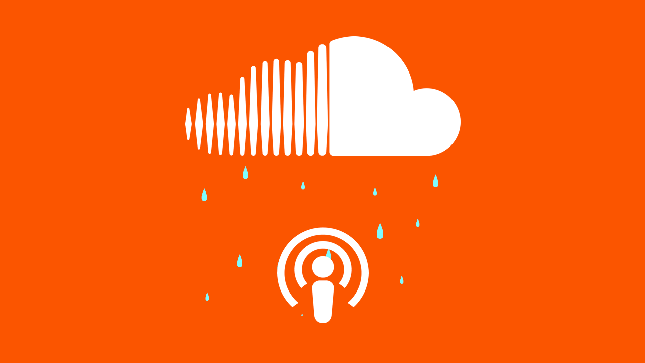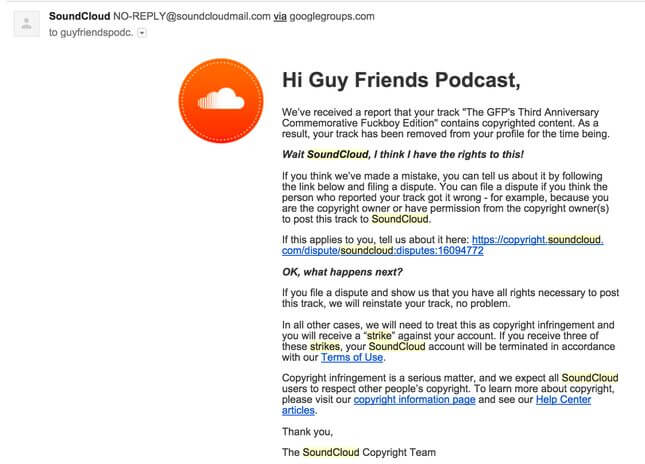How Soundcloud's Corporate-Friendly Overhaul Fucked Over One Small Podcast
Entertainment

In February 2012, two friends and I started a podcast. It wasn’t a complex idea. They’re two straight male comedians and one day, they made a joke about doing a dating advice podcast in which they’d advise only non-straight males. Why would anyone want their advice, was the hilarious joke. I took it seriously. That could be funny, I thought, and actually occasionally helpful. So we called it the Guy Friends Podcast, we did a test episode, and we signed up for Soundcloud, which seemed then like the easiest and best way to post episodes and feed them to iTunes.
Our podcast lasted until this past week, when Soundcloud pulled our entire archive off their platform, as they have in recent months to a slew of individuals big and small. It’s clear foreshadowing: The company’s future financial success is predicated not on small payments from small users, but on big deals with large record labels. We certainly knew this was coming, but whether there was anything we could do about it was another story.
When we started the Guy Friends, I was working for the public radio station WBEZ in Chicago, which was using Soundcloud as a way to get its radio content out to a more internet-friendly audience. In those days, Soundcloud was very amenable to the Guy Friends; according to our emails, they allowed us to sign up for their then-beta “podcast program,” which meant they upgraded our free account to paid premium one for a year, giving us unlimited hours of uploads, plus the ability to see play counts and who was listening where—all for free. It was, for a team of people who had very little money and were just starting out in the business, an extremely encouraging way to start.
The way the episodes worked is the “Guy Friends” Josh and Aaron would introduce the user-submitted or crowdsourced questions, and then answer two or three of them, before wrapping up at the end with a segment where I would typically lambaste them over their advice. In between these segments, I’d intersperse short music clips—all remixes that other Soundcloud users had uploaded, but only those that were labeled available under Creative Commons.
How music can be used in podcasts under fair use is complicated, as fair use often is, but I’d tried to purposely use tracks that were more “transformative” than regular remixes, and I credited them in each episode. For the first couple episodes, as we were testing things out, I’d intro’d and outro’d using Rufus and Chaka Khan’s “Tell Me Something Good,” which Soundcloud rightfully shut down. From then on, I chose remixes and mashups that the platform had allowed users to upload to the site, and that those users had said others could download and use. We were transparent about this process, creating a whole playlist on Soundcloud of the tracks we’d sampled for listeners to enjoy.
After our year of a free and easy Soundcloud life was up, we figured we’d have to strap in and and pay the then $200-plus to keep what was then called a “Premium Pro” account. As fate would have it, we learned through our new co-producer (and my former WBEZ co-worker) Lauren that Soundcloud wanted to give WBEZ employees free personal accounts, and that the Guy Friends account would qualify as one. Though we’d already paid for our Premium Pro account, Soundcloud even refunded us our money. For the next couple years, the show proceeded as normal; Josh and Aaron moved to New York, we started recording here, continuing to treat the podcast as something slightly more serious than a hobby we did in our spare time. The guys wrote blog posts for How About We’s Date Report. We did a really fun live show back in Chicago that our friends and listeners attended.
But there’s no real record of that work online anymore, because last week, Soundcloud terminated our account for “copyright infringement” on old tracks that purportedly used remixes no longer deemed acceptable, remixes that were considered in violation of the Digital Millennium Copyright Act. You can’t listen to anything we’ve ever created in three-plus years on iTunes either, as the RSS is broken. We face a dilemma many others who work online have dealt with as websites are shut down or reworked; our links are dead, our content is sailing around like ghost ships on the internet.

In July, Soundcloud had sent us an email warning us about the first of three “strikes” for an episode they said had been reported for including copyrighted music (it sampled a Tinashe song), and telling us that they had taken the episode down. An automated email said we could file a dispute about the removal, but as would be the case each time we emailed them back and explained the situation, a person from the “SoundCloud Copyright Team” either said there was nothing they could do or did not respond.

An excerpt from an email from Souncloud, which was the most detailed response we received to our questions about our violations.
-

-

-

-

-

-

-

-

-

-

-

-

-

-

-

-

-

-

-

-

-

-

-

-

-

-

-

-

-

-

-

-

-

-

-

-

-

-

-

-








































